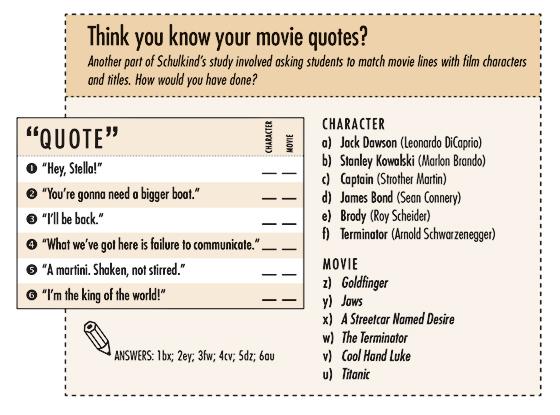"No, I Am Your Father"
Are men more likely than women to accurately recall movie lines? As part of a psychology professor’s research into this question, Angelina Gomez ’14 has scrutinized exactly 635 quotes that Amherst students think they know by heart.
By Angelina Gomez ’14
My parents recently went on a vacation to Hawaii. While talking to my mom about the trip, I heard about the colors of the flowers they saw on a hike, how she felt about taking time off work, how she had arranged for someone to take care of their cat while they were away, the flavors of the fish they ate and more. My dad’s report of the week: “We hiked. We swam at bit. The hotel was nice. It was fun!”
I’m not the first to notice a general difference between the stories told by males and those told by females. When you ask a woman how her weekend went, you had better be ready to hear all of the details, including explanations of emotions, relationship dynamics and relevant previous events. Conversely, men are more likely to stick to factual accounts of what happened, where and with whom. This observable difference is more than just a stereotype: Researchers such as Robyn Fivush at Emory University, David Pillemer at the University of New Hampshire and Qi Wang at Cornell University have demonstrated that men and women have different abilities to remember events in their lives. In the field of psychology, this is known as autobiographical memory, and most research has found that women are better at it than men.
But are women actually better at recalling events in our lives, or are we simply more loquacious storytellers? The “factual bias” that men display could deter them from telling the rich, detailed stories that women tend to tell. The basic idea of factual bias is that, when men are instructed, “Tell me about an event from your past,” they interpret that to mean, “Tell me all the facts from an event,” while women hear, “Tell me about an event and provide insight into how and why it happened.”
Matthew Schulkind, associate professor of psychology, is testing whether this factual bias extends to non-autobiographical areas of memory, using subjects’ ability to recall movie quotations as a measure. In his experience, men are more likely than women to have internal caches of movie lines that they can spontaneously produce and quote at one another. Could he turn this anecdotal evidence into scientific evidence? Last semester, he asked students—both men and women—to recall movie quotes. He dumped their recollections into a massive Excel spreadsheet that would make Hollywood proud.
And this is where I come in. Last summer I sifted through that spreadsheet and coded the accuracy of all 635 quotes. This means that I got paid to search the Internet Movie Database (IMDb), watch YouTube clips, download entire movie scripts and generally comb the Internet to find movie dialogue. Needless to say, I loved this job.

Let me give you an example of a typical day’s labor. Subject Number 6’s seventh movie quote was, “Lunch will be canceled today due to a lack of hustle,” supposedly said by the character Tony Perkis in the 1995 movie Heavyweights. Eleven words. The actual quote, according to IMDb, is, “Lunch has been canceled today, due to lack of hustle.” Ten words. Therefore, Subject Number 6 got eight words, the character and the movie correct. So I went to my spreadsheet and entered a code that stated all this. By August I had coded all the quotes. The last was a sassy quip from another 1995 film, Clueless. (Tai: “Why should I listen to you, anyway? You’re a virgin who can’t drive.” Cher: “That was way harsh, Tai.”)
I found commonalities in the subjects’ selection of quote-worthy movies. To sum up: My generation likes oddball humor, “chick flicks” and Harry Potter. We also like quotes from animated movies (especially Finding Nemo and Shrek) and other movies we watched as children (1987’s The Princess Bride cleaned up, with 12 quotes). I have a theory that such movies hold a special place in undergraduate hearts: As we are letting go of our early years, we want to recall the trials of Princess Buttercup and her Westley with ease and fondness.
However, what I refer to as the “ridiculous movie” category was by far the most popular. The most quoted movie overall, with a whopping 38 quotes, was the 2004 Will Ferrell blockbuster Anchorman: The Legend of Ron Burgundy, the source of such salient lines as, “I’m in a glass case of emotion!,” “I love lamp,” and, of course, “You pooped in the refrigerator? And you ate the whole ... wheel of cheese? ... Heck, I’m not even mad; that’s amazing,” spoken to a semicommunicative dog. The next-most-quoted movie
was 2008’s Step Brothers, another Will Ferrell flick, with 19 quotes. In fact, I’m going to simplify my earlier summary: Young adults today remember, word-for-word, what Will Ferrell says in movies better than we remember our grandmothers’ birthdays.
The point of Schulkind’s study, however, is not to comment on the movie preferences of undergraduates (that’s just fun) but rather to see how accurately people can remember quotes. As the statistical analyses are forthcoming, I can make only general observations. Some subjects were better at technical accuracy, and others wrote quotes that, while identifiable, were only vaguely correct—a trend Schulkind was hoping to see in the data, as it indicates a factual bias. I wasn’t given the subjects’ genders, so I can’t make any preemptive conclusions, but I am excited to see how the study pans out.
I was just one of many students doing research with various professors last summer. I have one friend who, for an LJST project, had to watch hours of footage from executions; another who used GIS (geographic information system) software to analyze deforestation in Mexico; and a third who excitedly told me in August that her bacterial cells had finally matured and now she could infuse them with estrogen.
It is exciting to take part in the process of bringing more information into the world. And we aren’t even grad students. So what may seem like another day of hangings or Star Wars lines is ultimately one of the many benefits of being an Amherst College student.

Angelina Gomez is a double major in music and psychology. She is from San Francisco.
Photo by Rob Mattson